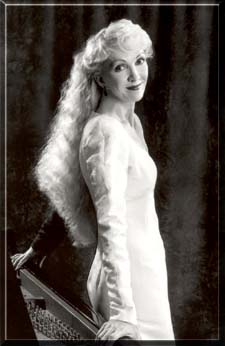"Where
Words Can Never Reach": Teresa Walters Talks about Liszt's Sacred
Piano Music Over the past 20 years we've witnessed an increased attention to (and appreciation of) Liszt's music. Even so, most of his sacred piano pieces-works like Urbi et orbi or L'Hymne du Pape - remain nearly unknown, and it's unusual for a pianist to place them at the center of his or her repertoire. But then again, as became clear in a conversation in February, Teresa Walters, who has devoted two CDs and a good part of a third to this material, is an unusual pianist.
Fortunately for Walters, her early teachers knew their limitations: "They had the insight to tell my parents that there wasn't that much they could do, and they needed to find me a teacher who could work with a talent, as it were. I give them credit for that too, knowing that they should send me on." So her parents "made a long commute to Lincoln and to Omaha where there were fine teachers. "I didn't really have the physiology for farm work, so it kept me from being bored. All that practice gave me something to do. Of course, there were not a lot of performance opportunities as there are for kids in the metropolitan areas, so I guess in that sense I'm a bit of a late bloomer, but I don't regret it, because I think growing up in that farm environment gave me a real stability as a human being. That serves me well in my adult life, with all the travel and all the different people I have to meet and relate to. I'm grateful; I think it all worked out in the end." Her artistic trajectory became a bit more traditional when she entered Peabody. It was, she says, "a wonderful change of scenery, to be side by side with students who had the same aspirations I did and teachers to whom talent was not a surprise. It was like getting wings, almost. I had a kind of artistic loneliness that hungered to be nurtured." She studied with Julio Esteban, who "was just a wonderful influence. We related so well from the very beginning. He had those typical weekly studio recitals where all of his students got together and played for each other, and I just loved the whole thing. And he had so many contacts around the whole world. I guess the next big step was going to Paris for a year, where I got to have conversations with Nadia Boulanger at the end of her life. That took it all to a more international dimension. I'm amazed at the people who ask me who Boulanger was. Particularly the young people, the college-age and high-school-age students: They have this vague notion, but as far as the full impact of her work . . . Her legacy needs to be kept alive as that older generation of her students passes on. And it's a good opportunity to teach them about Lili Boulanger." She played Lili's Three Pieces for Piano in Paris a few seasons ago: "Those pieces are not well known, but they are so nice: They prophesy Impressionism, and they have all kinds of nice harmonic colors. I'd like to record those someday." So what made her turn to Liszt's sacred music? Was it in part her church background? "Probably. It was a natural evolution. I have always had an affinity for Romantic music in general, and out of that grew a love for Liszt in particular. At first, I had a stereotypical view of Liszt, and played the flame-throwing pieces that everybody learns. But Thomas Fritz, with whom I was studying at the time, said, `You know, there's this corner of the repertoire that is not well known. With your spiritual roots you might be interested in exploring it.' I kind of put it in the back corner of my mind--but at that time I didn't know as much about Catholicism as I do today. I didn't really begin exploring it until maybe half a dozen years ago, about the time that I started to have a strong connection with a Catholic women's college here, the College of St. Elizabeth in Morristown, New Jersey. I'm artist-in-residence there. And I have a lot of opportunities to play my programs there and to meet with the classes on a more informal basis and talk to them about the music and about the life of a concert pianist. It really has had wonderful ramifications all around. And as I learned more about the Catholic Church since Vatican II, I became more comfortable with their ministry and their mission statement, and it all just evolved." Yet while her interest in this repertoire came late, it does tie back to her early years: "There is most definitely a faith connection, I guess, going back all the way to my childhood. I've been comfortable with spirituality and with the spirituality of music." Her own evolution matches what appears to be an evolution in her audiences. "For years there really wasn't a place for these works, which were considered to be too religious for the concert stage and too flashy for the church. But I think maybe the time is right; I think the world is looking for more spiritual overtones. So I guess I'm finding that there is a unique niche for it. The door just seems to be opened. I don't know if you're a spiritual person, but I have to say it's almost in higher hands. Maybe Liszt is up there opening some doors. He always wanted this music to have a wider audience during his lifetime and it didn't happen then. Maybe - because of some of the well-known aspects of his personal life - people thought he was a charlatan when he tried to take these holy orders, and no one could take the music seriously." Interestingly enough, she finds that all kinds of people all over the world are taking his religious music seriously now: rich people and poor, even in countries without strong Christian traditions. "It came to me at about the time I was playing in Esterhazy Palace last October that this music is not meant just for the gilt-covered palaces of Europe. It also has a message for people in the poorest regions of the world. In addition, when I played in Japan, a Buddhist country, it was really well received." This year, she'll be taking two trips to India, where, among other things, she will be playing a couple of benefits for the earthquake victims, as well as a benefit for a children's school in Delhi called the Good Samaritans Children's School. And on her second India trip, too, she will be including Liszt's sacred piano music. "All of the world's major religions have in common things like invocation, hymn of morning, hymn of night, psalms.. .`so in a way it's universal. And I think when we don't have words to get in the way of our theology, this pure instrumental idiom can speak more freely." But even with the match between her own spiritual affinities and those of her listeners, Waiters finds that this music requires a very special kind of preparation. In part, because much of the music is superficially simple, one needs to be especially alert to the basic line of the piece. "I'm thinking right now of a piece from the first Abbé Liszt CD, Urbi et Orbi, about the Papal Benediction: At the end of that is an awesome section where you feel you should have the Pope come on the stage and sing the part - to just play that single line in the baritone range of the keyboard never seems like enough. So I find that in those sections I really have to listen for the line and follow Nadia Boulanger's advice, la grande ligne. If anything will make it come to life, that will do it." Even more important, though, is what she calls "psychological preparation": "I find I need not only a technical preparation and the obvious music things that you do to get things ready to share on stage, I also need to do a greater psychological preparation, because, unless there is a sincerity behind this, I'm not able to share it the way that I want to. So there are lots of levels of preparation that go on." That preparation not only influences her performances but has a deeper impact as well: "This music has changed me. It has made me more sensitive to the spiritual. Maybe that's what Liszt had on his mind when he wrote it." What exactly is involved in this psychological kind of preparation? "You know, a lot of these religious works are based on literary texts. Harmonies poétiques et réligieuses are based upon the work of Lamartine, as are the Hymns of Morning and Night that are on this new CD. So I always try to read the original text. In this case, that means reading it in French, which takes me a little bit longer, but which I can do. The Psalms, of course, are based on the Old Testament; so I always read and reread those, and in fact sometimes try to memorize those psalms so that they come to me onstage. And I think this all comes through in the music. I'm doing The Canticle of the Sun of St. Francis of Assisi this season, and I have memorized that text, because that's actually written out the score. When she's performing, does she think of the text as she's playing? "Definitely. In the Penseés des morts, that section where the De Profundis arrives - I remember vividly an unforgettable time I played that for a Holocaust memorial, a Kristallnacht memorial, at the college where I teach. It's an annual event. We invite survivors of the Holocaust, and they light candles and then take their places in the audience. And when I played this, and it was just . . . it was an out-of-body experience, but the words of the psalm still came to me because they were so appropriate in that setting." Yet paradoxically, in the end it's music's ability to transcend words that's central: "I know it spoke to people that evening, because I took the hands of people afterwards, and there were joint tears. Music can speak to us in a place where words can never reach. It's a very humbling thought as I try to do justice to this repertoire, but its also one of the most fulfilling things about it and why I'm committed to it." One curiosity of the second CD in her series is the presence, among the overtly sacred works, of the Sonata. Does this mean that Walters views it, too, as having religious overtones? "I do. I first studied that piece at Peabody with Julio Esteban, and he said to me before we began, `You know, this piece is 30 minutes of the struggle of good and evil.' I realize that Liszt himself did not ever put it into those words, and that maybe for some that theory is no longer in vogue. But I still truly believe that that is a facet of that great Sonata. I hear it in the transformation of themes, I hear it in the long line from beginning to end, from the first note to the last. Unless there's some kind of spiritual awareness of that facet of Liszt's psyche, I don't think that Sonata can be fully understood." Walters sees her presentation of this repertoire as "a lifelong pursuit" - and future CDs are planned. But, as she points out, "We're pacing them, every two years or so. I don't want to get burned out. So I want to give myself a year or two now before the next in the sequence and keep it fresh and keep psychologically rested. I want occasionally to have a season where I play Beethoven, where I do concerto work (in fact, she'll be playing the Emperor Concerto in Bombay next fall), where I have a chance to revive Lili Boulanger, do some of the other Romantic composers, maybe include, on the program a sampling of this religious side of Liszt but not have the whole program be inundated with it. In fact, she has discovered that some of the less elaborate pieces "work well as an encore, particularly the Ave Maria d Arcadelt, which is very touching. People always love that." She elaborates on the pressures of her career: "The busier I get the more I see how all-consuming it can be, and I want to have a life that makes the music sound worthy. I don't want to be so saturated that I can think of nothing else. I'm playing now sometimes twice a week, sometimes three times a week. I've always had this almost sacred time in the summer in July and August where I don't like to play and where I like to devote myself to learning new music for the coming season, and even that is disappearing. In July, I'm going to Spain for a festival and some recording with the Liszt Society of Spain, so more and more of these times that I've reserved for life enrichment are being infringed upon by increasing concert work. It's good, but I can see that I will need to have some boundaries. How will she know? "I think I'll know when I've reached a limit. Right now it's such an exciting time, because more and more of the international work is coming through. I'm off to Monterey in Mexico in March, and it looks like next year in March I'll be in South America, starting with a debut in Brazil. And everyone wants to hear this sacred Liszt." Given her background, her musical tastes, and her spiritual affinities, it's perhaps not surprising that Walters lives, not in Manhattan, but in "a house on a lake in western New Jersey. One of my pianos is down on the lake in a remodeled boathouse. I really love that. I can look out and see the lake covered in snow right now and some people ice-fishing, and when the seasons are nice there are lots of songbirds and lots of waterfowl. Sometimes in the fall we get as many as 50 or 75 swans that come to spend the winter. I had this concept of New Jersey looking like the Turnpike, but there is the `other' New Jersey." Nor is it surprising that her love of real birds has had an influence on her performance of St. Francis of Assisi: The Sermon to the Birds. "I'm an avid bird-watcher, so I've always loved that piece. This year is the 775th anniversary of the death of St. Francis of Assisi, who was Liszt's patron saint. I'm playing Canticle of the Sun and, with that, Sermon to the Birds." In fact, she'll be playing them at a commemoration at Assisi: "I think that would be something that would please Liszt." As would, no doubt, her devotion to the rest of this repertoire so scorned by his contemporaries. |



 "I grew up on a farm in Nebraska," she says. "It is not a Mecca for
classical music. Football was real big, and the priorities are the weather (because that
affects the land and the growing of crops) and the care and feeding of livestock."
There was no piano in her house, but, fortunately, her grandparents had one. "They
tell me that there was a family gathering one day when I was about four. I heard something
that came on the radio and went to the piano and played it. They all stopped what they were
doing and realized that this was most unusual. From then on they tried to get me lessons.
Luckily, there was a church a mile down the road with which my family was very
involved." The church was committed to music and "continues to be very musical
to this day." So she began studying with musicians there.
"I grew up on a farm in Nebraska," she says. "It is not a Mecca for
classical music. Football was real big, and the priorities are the weather (because that
affects the land and the growing of crops) and the care and feeding of livestock."
There was no piano in her house, but, fortunately, her grandparents had one. "They
tell me that there was a family gathering one day when I was about four. I heard something
that came on the radio and went to the piano and played it. They all stopped what they were
doing and realized that this was most unusual. From then on they tried to get me lessons.
Luckily, there was a church a mile down the road with which my family was very
involved." The church was committed to music and "continues to be very musical
to this day." So she began studying with musicians there.